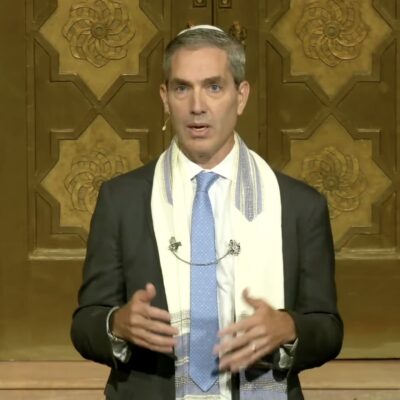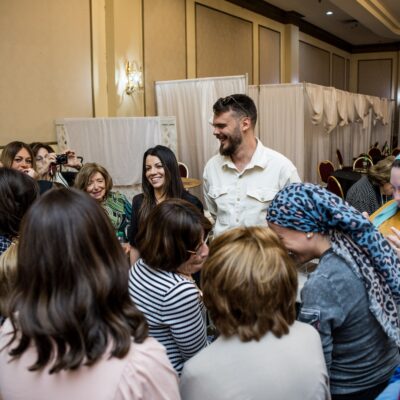PULPIT POLITICS
‘Prophets didn’t campaign for kings’: IRS ruling opens rabbis to pressure to endorse candidates
New change removes 'fig leaf' that helped rabbis abstain from supporting candidates; some denominations say they'll discourage political endorsements, others say they're still considering

Getty Images
Jonah Preaching to the Ninevites (Jonah 3). Wood engraving from the book "Volks_Bilderbibel" (People's Pictures Bible)", published by Baumgärtners Buchhandlung, Leipzig in 1835.
For over seven decades, rabbis have had an excuse to not endorse politicians, no matter how much pressure was heaped upon them, but this changed Monday when the IRS reversed a decade-old ban on clergy supporting candidates from the pulpit. Prior to this, congregations would lose tax-exempt status if religious leaders openly stumped for politicians.
“This may have taken away a fig leaf from certain religious leaders whose congregations might have wanted them to speak more directly in these issues, but who could say, ‘Because of this rule, I can’t endorse,’” Jerome Copulsky, a Berkley Center for Religion, Peace and World Affairs research fellow who specializes in church-state issues, told eJewishPhilanthropy.
The decision was made in a court filing after two churches and an association of Christian broadcasters sued the IRS to reverse the 1954 Johnson Amendment, named for then-Sen. Lyndon B. Johnson, who introduced the amendment, which set nonprofit tax laws connected to politics. The filing said that campaigning within houses of worship is now seen as “a family discussion.” Rabbis across denominations agree that endorsing candidates from the pulpit will only bring problems to the family.
“If you look at the recent announcements from President Trump and from the Trump administration, there has been an attempt to be more assertive in speaking about religion in political spaces,” Copulsky said. For years, the president has called to revoke the amendment with support from many within the religious right. In 2017, evangelical leader Rev. Jerry Falwell Jr. said the shift would “create a huge revolution for conservative Christians and for free speech.”
“The idea [is] that somehow Trump and the Trump administration is bringing religion back into American public life,” Copulsky said. “Religion was always a part of public life, but they’re bringing a certain kind of conservative religion as part of the [Trump] brand.”
This shift may open congregations and denominations up to overwhelming pressure from politicians. “A pastor or a rabbi’s support can become a leverage point [for] the way a candidate treats a certain community, especially the Jewish community,” Rabbi Oren Steinitz, the rabbi at Conservative Congregation Beth Sholom-Chevra Shas in Syracuse, N.Y., told eJP.
Politicians could then say, “I’ll give you the budgets you need for security if you endorse me,” he said. “It’s pretty obvious that it’s going to be used as a divisive mechanism. That’s probably the reason they’re doing it, to find out who’s with them, who’s against them.”
For many rabbis, endorsing politicians could be attractive, especially if they are concerned about “the structural changes in American democracy that we are witnessing,” Rabbi David Saperstein, director emeritus of the Religious Action Center of Reform Judaism, told eJP. He fought to protect the Johnson Amendment for over 40 years as a lawyer.
On Tuesday, the Reform movement was the first major denomination to issue a statement about the IRS decision, saying the move “weakens the principle of church-state separation that has protected both government and religion” and calling on Congress to reverse the change. (Both the United Synagogue of Conservative Judaism and Reconstructing Judaism declined to discuss the ruling, saying that they were still contemplating how to respond to the changes.)
The Reform movement is “urging” rabbis not to endorse politicians if they are connected to congregations, Saperstein said.
Although the Orthodox Union has not released a statement, Rabbi Moshe Hauer, executive vice president at the Orthodox Union, told eJP, “A valuable and applicable component of the IRS position is its description of the congregation as family, equating its internal discussions to those at the family table, Synagogues should always convey the feeling of home and family to all who enter and avoid introducing the current divisive political discourse into our congregations.”
If congregations begin endorsing politicians, it is going to further surge polarization, which is already “through the roof, religiously, politically, due to the Gaza war, on all levels,” Rabbi Shmuly Yanklowitz, the president and dean of the Valley Beit Midrash, a national Jewish pluralistic adult learning and leadership center, told eJP.
It could lead to non-Jewish communities further tokenizing Jews, deeming who they feel is a “good” or “bad” Jew, Yanklowitz said. It can also lead to those within Jewish communities forming more of a litmus test for who is accepted. “It’s not just that rabbis are going to be at the front of pushing [political candidates]. It’s going to be that boards or donors are going to push their rabbi to do it.”
For many congregations, the political diversity of congregants will keep rabbis in check, Rabbi Daniel Aronson, of Reconstructionist Congregation Ahavas Achim in Keene, N.H., told eJP.
“As the rabbi of one of only two non-Orthodox synagogues within a 26-mile radius of my small New England town, I go out of my way to show respect for political views that are different from my own,” he said. “The possibility of losing full dues-paying members over a political rift is more of a check on campaigning from the bimah than any legislation could ever be.”
Still, many leaders may believe it’s beneficial to market themselves based on their politics, he said. “In cities where people have lots of options, some synagogues not only feel they have less incentive to remain politically neutral, their political views differentiate themselves from their ‘competition.’ They build their ‘brands’ around their politics.” Doing this will leave political outliers in the congregation “ostracized,” he said, adding that they could “suffer other serious consequences for thinking independently.”
To have a rabbi bring politics onto the pulpit is a “foolish” move, Motti Seligson, director of media for the Chabad-Lubavitch movement, told eJP.
“The synagogue is a holy place, and it’s above the political moment,” he said. “We’re seeing politically how things shift and swing increasingly quickly… One thing that’s consistent about every trend is it ends, so why hitch the congregation’s wagon to a trend?”
In reality, politicking from the pews is nothing new, though. The Johnson Amendment has rarely been enforced, and “the nation’s churches and synagogues and mosques [have] never been this pure space of being above the fray,” Copulsky said. “Whether or not there’s been direct endorsements, endorsements have been pretty close to direct.” Even congregational rabbis have outright endorsed politicians, such as in the case of many who were connected to Rabbis for Obama.
There need to be lines for rabbis, and endorsements are beyond the pale, Yanklowitz said. “Everything is political. All language choices are political, and even silence is political, but there’s different layers of political life.”
Rabbis should take stances on societal ethics and values, but with nuance, rooted in Torah, he said. “What’s so beautiful about Torah is that it is about dialectical tensions. For every value, there is a competing value. That doesn’t mean we’re just relativists. There’s still morally robust positions to take, but you always hold that competing value. Once you endorse a candidate, what you’re doing is removing those tensions and removing the ideals and just pretending that the richness of Torah can be squeezed into a tiny, neat partisan box.”
By not explicitly endorsing politicians, religious leaders can be morally engaged and discuss issue-based advocacy, such as refugee support and climate action, across party lines, Armin Langer, a Reconstructionist rabbi who has held teaching and pulpit positions in Jewish communities in the U.S., Mexico, Sweden, Germany, Austria and Hungary, told eJP.
“The prophets didn’t campaign for kings,” he said. “They held them accountable.”

 Add EJP on Google
Add EJP on Google









